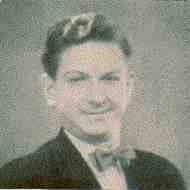Mystery Books
Mystery Movies
Mystery Authors
Edmund Crispin biography
British writer and composer, master of fast-paced, tongue-in-cheek mystery novels, a blend of John Dickson Carr, Michael Innes, M.R. James, and the Marx Brothers, as the critic Anthony Boucher once described. Crispin's nine humorous Gervase Fen novels are among the most individualistic works of the genre, making fun of literary conventions. He was a product of the University of Oxford - Crispin's friend during university years was Kingsley Amis.
"Crispin's work is marked by a highly individual sense of light comedy, and by a great flair for verbal deception rather in the Christie manner... At his weakest he is flippant, at his best he is witty, but all his work shows a high-spiritedness rare and welcome in the crime story." (Julian Symons in Bloody Murder, 1985)
Edmund Crispin was born in Chesham Bois, Buckinghamshire, of Scots-Irish parentage. He was educated at the Merchant Taylor's School in London. Before World War II Crispin traveled around Europe, particularly Germany. In 1943 Crispin received his B.A. from St. John's College, Oxford, where read modern languages. From 1943 to 1945 he worked as a schoolmaster at Schrewsbury School. His friend, the poet and novelist Philip Larkin (1922-85), worked nearby and they read each other's texts - Crispin also dedicated his third book, THE MOVING TOYSHOP (1946), to Larkin. His first detective fiction novel appeared in 1944, and introduced to readers his series character Gervase Fen, a cynical Oxford professor. The figure was partly based on the Oxford professor W.E. Moore.
During a nine year period (1944-1953) Crispin published eight novels, establishing his reputation in the field of mystery genre. In 1942 Crispin had read John Dickson Carr's novel The Crooked Hinge, which altered his view about detective stories and inspired him to create his own detective character. THE CASE OF THE GILDED FLY was published by Gollancz while its author was still an undergraduate. In his novels Crispin combined farcical situations with literary references, coincidences with nearly postmodern self-awereness, inappropriate behaviour and sharp observations of the language of various classes and professions. In The Moving Toyshop Crispin lets a truck driver preach "industrial civilization is the curse of our age... We've lorst touch with Nachur. We're all pallid... We'we lorst touch with the 'body.'"
Crispin's professional music career started in mid-1940s. Since the age of fifteen Crispin had played piano - in his youth he worked as an organist and choirmaster. Crispin composed under his own name, Bruce Montgomery, choral and orchestral works, songs, and film music, including several scores for Carry On series. He built a bungalow in Devon, and settled down to a quiet country life, collected classical records, and took an interest in church matters. After his short story collection, BEWARE OF THE TRAIN (1953), Crispin kept long silence as a novelist, but turned his attention increasingly to writing music. He became one of Britain's leading critics of detective fiction, reviewing from 1967 regularly for the Sunday Times. Crispin married late in life. In 1977 he published THE GLIMPSES OF THE MOON, the last Gervase Fen story. By the early 1970s, Crispin's drinking finally overwhelmed him and he started to have money problems. Crispin died on September 15, 1978.
As a science-fiction anthologist Crispin's work was unique in several ways. He was an early advocate of science fiction and made no apologies or excuses for presenting it as a legitimate form of writing - an attitute that was not common in the 1950s, when science-fiction was not yet respectable branch of literature. His selection of stories showed him to be throroughly familiar with its currents in both magazine and book form, and his introductions were informed and illuminating.
Information source: wikipedia